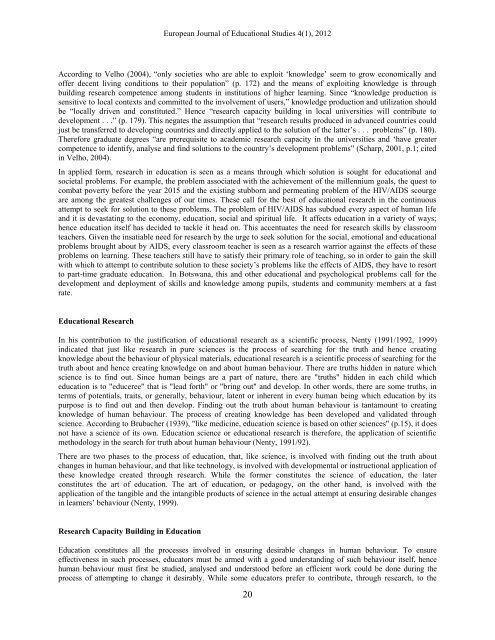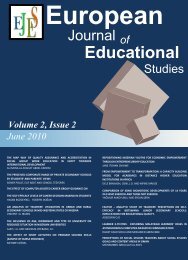Volume 4 Issue 1 (February 2012) - Ozean Publications
Volume 4 Issue 1 (February 2012) - Ozean Publications
Volume 4 Issue 1 (February 2012) - Ozean Publications
You also want an ePaper? Increase the reach of your titles
YUMPU automatically turns print PDFs into web optimized ePapers that Google loves.
European Journal of Educational Studies 4(1), <strong>2012</strong><br />
According to Velho (2004), “only societies who are able to exploit „knowledge‟ seem to grow economically and<br />
offer decent living conditions to their population” (p. 172) and the means of exploiting knowledge is through<br />
building research competence among students in institutions of higher learning. Since “knowledge production is<br />
sensitive to local contexts and committed to the involvement of users,” knowledge production and utilization should<br />
be “locally driven and constituted.” Hence “research capacity building in local universities will contribute to<br />
development . . .” (p. 179). This negates the assumption that “research results produced in advanced countries could<br />
just be transferred to developing countries and directly applied to the solution of the latter‟s . . . problems” (p. 180).<br />
Therefore graduate degrees “are prerequisite to academic research capacity in the universities and „have greater<br />
competence to identify, analyse and find solutions to the country‟s development problems” (Scharp, 2001, p.1; cited<br />
in Velho, 2004).<br />
In applied form, research in education is seen as a means through which solution is sought for educational and<br />
societal problems. For example, the problem associated with the achievement of the millennium goals, the quest to<br />
combat poverty before the year 2015 and the existing stubborn and permeating problem of the HIV/AIDS scourge<br />
are among the greatest challenges of our times. These call for the best of educational research in the continuous<br />
attempt to seek for solution to these problems. The problem of HIV/AIDS has subdued every aspect of human life<br />
and it is devastating to the economy, education, social and spiritual life. It affects education in a variety of ways;<br />
hence education itself has decided to tackle it head on. This accentuates the need for research skills by classroom<br />
teachers. Given the insatiable need for research by the urge to seek solution for the social, emotional and educational<br />
problems brought about by AIDS, every classroom teacher is seen as a research warrior against the effects of these<br />
problems on learning. These teachers still have to satisfy their primary role of teaching, so in order to gain the skill<br />
with which to attempt to contribute solution to these society‟s problems like the effects of AIDS, they have to resort<br />
to part-time graduate education. In Botswana, this and other educational and psychological problems call for the<br />
development and deployment of skills and knowledge among pupils, students and community members at a fast<br />
rate.<br />
Educational Research<br />
In his contribution to the justification of educational research as a scientific process, Nenty (1991/1992, 1999)<br />
indicated that just like research in pure sciences is the process of searching for the truth and hence creating<br />
knowledge about the behaviour of physical materials, educational research is a scientific process of searching for the<br />
truth about and hence creating knowledge on and about human behaviour. There are truths hidden in nature which<br />
science is to find out. Since human beings are a part of nature, there are "truths" hidden in each child which<br />
education is to "educeree" that is "lead forth" or "bring out" and develop. In other words, there are some truths, in<br />
terms of potentials, traits, or generally, behaviour, latent or inherent in every human being which education by its<br />
purpose is to find out and then develop. Finding out the truth about human behaviour is tantamount to creating<br />
knowledge of human behaviour. The process of creating knowledge has been developed and validated through<br />
science. According to Brubacher (1939), "like medicine, education science is based on other sciences" (p.15), it does<br />
not have a science of its own. Education science or educational research is therefore, the application of scientific<br />
methodology in the search for truth about human behaviour (Nenty, 1991/92).<br />
There are two phases to the process of education, that, like science, is involved with finding out the truth about<br />
changes in human behaviour, and that like technology, is involved with developmental or instructional application of<br />
these knowledge created through research. While the former constitutes the science of education, the later<br />
constitutes the art of education. The art of education, or pedagogy, on the other hand, is involved with the<br />
application of the tangible and the intangible products of science in the actual attempt at ensuring desirable changes<br />
in learners‟ behaviour (Nenty, 1999).<br />
Research Capacity Building in Education<br />
Education constitutes all the processes involved in ensuring desirable changes in human behaviour. To ensure<br />
effectiveness in such processes, educators must be armed with a good understanding of such behaviour itself, hence<br />
human behaviour must first be studied, analysed and understood before an efficient work could be done during the<br />
process of attempting to change it desirably. While some educators prefer to contribute, through research, to the<br />
20

















